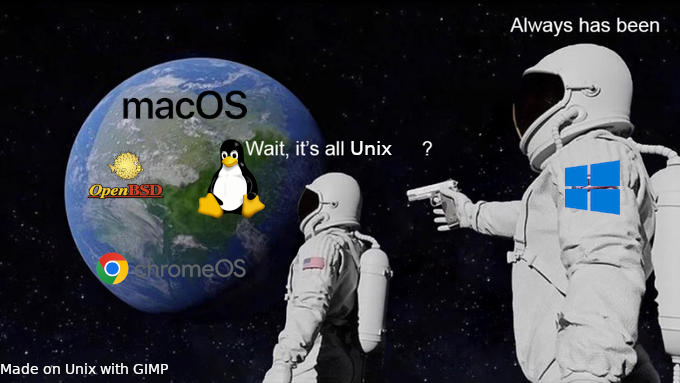this post was submitted on 03 May 2024
379 points (93.0% liked)
linuxmemes
21667 readers
1603 users here now
Hint: :q!
Sister communities:
Community rules (click to expand)
1. Follow the site-wide rules
- Instance-wide TOS: https://legal.lemmy.world/tos/
- Lemmy code of conduct: https://join-lemmy.org/docs/code_of_conduct.html
2. Be civil
- Understand the difference between a joke and an insult.
- Do not harrass or attack members of the community for any reason.
- Leave remarks of "peasantry" to the PCMR community. If you dislike an OS/service/application, attack the thing you dislike, not the individuals who use it. Some people may not have a choice.
- Bigotry will not be tolerated.
- These rules are somewhat loosened when the subject is a public figure. Still, do not attack their person or incite harrassment.
3. Post Linux-related content
- Including Unix and BSD.
- Non-Linux content is acceptable as long as it makes a reference to Linux. For example, the poorly made mockery of
sudoin Windows. - No porn. Even if you watch it on a Linux machine.
4. No recent reposts
- Everybody uses Arch btw, can't quit Vim, and wants to interject for a moment. You can stop now.
Please report posts and comments that break these rules!
Important: never execute code or follow advice that you don't understand or can't verify, especially here. The word of the day is credibility. This is a meme community -- even the most helpful comments might just be shitposts that can damage your system. Be aware, be smart, don't fork-bomb your computer.
founded 2 years ago
MODERATORS
you are viewing a single comment's thread
view the rest of the comments
view the rest of the comments

I always assumed that a lot of this boils down to semantics and trademark law.
OpenIndiana is a direct code-line descendant of Unix System V through OpenSolaris via Solaris. Thank you for that, Sun Microsystems. I understand (but haven't looked) that a lot of code these days is simply ported over from BSD or Linux. If you compare the source code to an old copy of the Lions book, you're probably not going to see any line-by-line overlap. Thank goodness - we shouldn't be literally running old operating systems from the '80s. I don't think that OpenIndiana is Unix-certified by the Open Group (Trademark).
The BSDs started out as a sort of 'Ship of Theseus' rebuild of an academic-licensed copy of Unix around the time that AT&T was getting litigious and corporate Unixes (Unices?) were starting to Balkanize.
GNU/Linux started out as a work-alike (functions the same but with totally different code) inspired by MINIX, which in turn was an education-licensed Unix work-alike designed to show basic operating system principles to students. I think that one or more linux-based operating systems have obtained UNIX certification from the Open Group, just like Apple did for MacOS (paying money and passing some tests). It doesn't seem like any of them are still paying to keep up the certification. Does it matter if they did at one point?
Going back to proprietary corporate Unixes, I believe that IBM AIX and HP-UX still exist as products. They started out as UNIX and have been developed continuously since then. They are both Certified Unix. By now, their codebases probably diverge substantially both from one another and from all of the Unix-likes. IBM also has a mainframe OS with a fascinating history that has nothing to do with UNIX. It is Certified Unix because it passes the right tests and IBM paid for certification. It is not UNIX code and doesn't descend from UNIX code.
Simple as.
Regarding the true Unix, there was also Unixware, which was AT&T's effort to move Unix to PCs (with Novell). It later passed on to SCO before they were sold, restructured, renamed and rebranded and subsequently became lunatics, In the end it seems like they offloaded it so some other company that's just letting it die.
It was a good system. Not super fun, but industrial strength server stuff that was really reliable. Bit of a shame.
But of course, Linux was just simpler for everyone, it just doesn't make sense to keep a million proprietary systems.
I agree.
A part of me misses the days of dual-using a rock solid professional server OS for business and a cobbled-together similar OS for home computers and older hardware.
Cobbled-together became good enough. Then it became better in some cases. Then it became better in most cases. Now I haven't bothered with a non-Linux for over half a decade.
BSD kernel and is hardware driver policies are still very interesting to use and mess with. I run OPNsense on a device that has recently completely replaced my residential router and it's fun to realize how complex everything is magically working together on a system that looks and feels familiar but is literally completely alien outside of GNU applications and package manager.
When I played around with FreeBSD I was fascinated by Securelevels and file flags. I don't have any real use for that functionality on the systems that I run, but I probably would've thought of something by now if it was a Linux feature.
Im using freebsd on my nas because it has better zfs support than linux does. Or at least was the case as of a couple years ago.
Originally i just threw a few extra drives into my old Arch machine, but i noticed my package upgrades were being held back because zfs on linux (or whatever they called it) was dependant on older kernels or something. I cant remember the exact details.
I owe myself a fresh install of freebsd on decent, well-supported hardware sometime. I end up shoving it on niche, constrained or old hardware to see if I can get better results than linux. One day, I'll give it a real rundown on modern hardware.